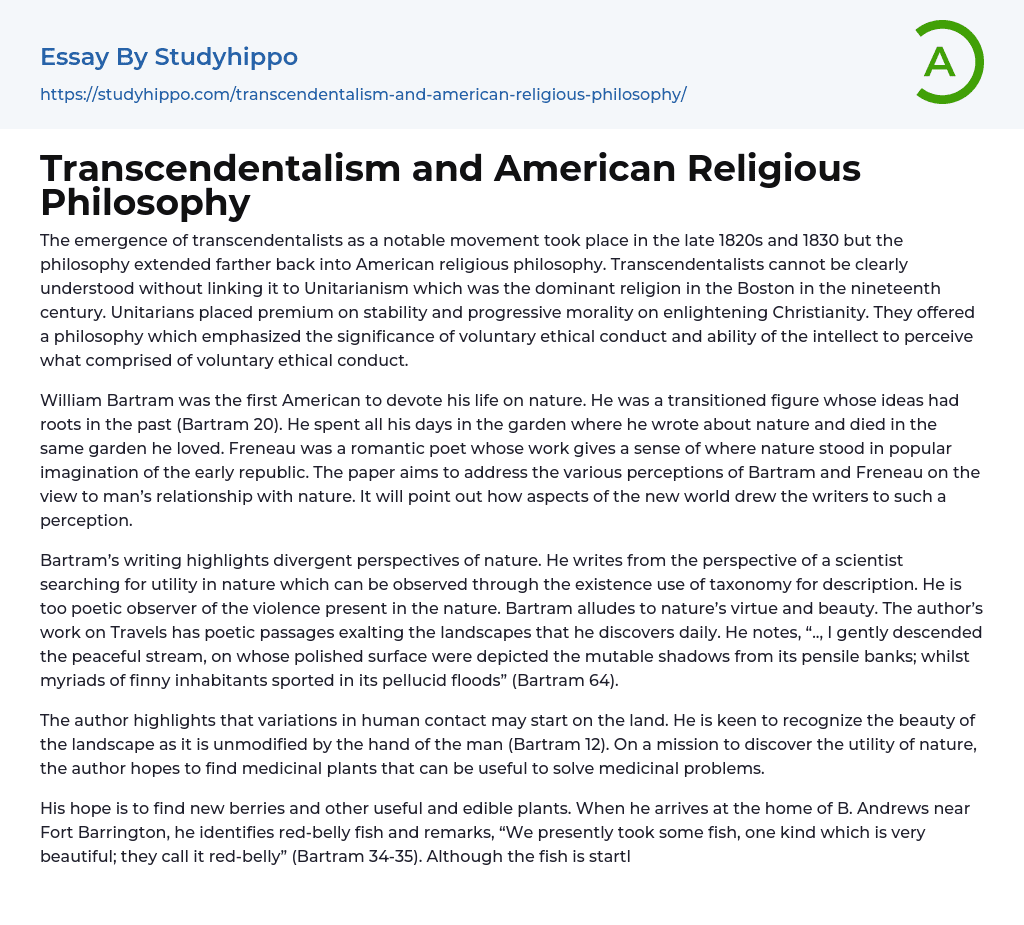

Transcendentalism and American Religious Philosophy Essay Example
The emergence of transcendentalists as a notable movement took place in the late 1820s and 1830 but the philosophy extended farther back into American religious philosophy. Transcendentalists cannot be clearly understood without linking it to Unitarianism which was the dominant religion in the Boston in the nineteenth century. Unitarians placed premium on stability and progressive morality on enlightening Christianity. They offered a philosophy which emphasized the significance of voluntary ethical conduct and ability of the intellect to perceive what comprised of voluntary ethical conduct.
William Bartram was the first American to devote his life on nature. He was a transitioned figure whose ideas had roots in the past (Bartram 20). He spent all his days in the garden where he wrote about nature and died in the same garden he loved. Freneau was a romantic poet
...whose work gives a sense of where nature stood in popular imagination of the early republic. The paper aims to address the various perceptions of Bartram and Freneau on the view to man’s relationship with nature. It will point out how aspects of the new world drew the writers to such a perception.
Bartram’s writing highlights divergent perspectives of nature. He writes from the perspective of a scientist searching for utility in nature which can be observed through the existence use of taxonomy for description. He is too poetic observer of the violence present in the nature. Bartram alludes to nature’s virtue and beauty. The author’s work on Travels has poetic passages exalting the landscapes that he discovers daily. He notes, “.., I gently descended the peaceful stream, on whose polished surface were depicted the mutable shadows from its pensile banks
whilst myriads of finny inhabitants sported in its pellucid floods” (Bartram 64).
The author highlights that variations in human contact may start on the land. He is keen to recognize the beauty of the landscape as it is unmodified by the hand of the man (Bartram 12). On a mission to discover the utility of nature, the author hopes to find medicinal plants that can be useful to solve medicinal problems.
His hope is to find new berries and other useful and edible plants. When he arrives at the home of B. Andrews near Fort Barrington, he identifies red-belly fish and remarks, “We presently took some fish, one kind which is very beautiful; they call it red-belly” (Bartram 34-35). Although the fish is startling its beauty the thought in the author is how to use it as food.
Freneau was more inclined on natural objects with emphasis and interest that was aesthetic than spiritual metaphysical. The poem on wild honeysuckle expressed the beauty of flower obstructed in the thick woods. The brief existence of the flower was an indicator of the appeal that drove him to write on the deaths about ruins by tuberculosis. Freneau attraction to primitive led him to the theme from Virgil’s Eclogues, peace and rural retreat as opposed to the corruptions found in urban centers. The author stood near the edge of American culture and was keen in his interest on nature.
The place of nature according to his outlook displays limits that are much more widely shared (Freneau 22). Appreciation of natural beauty was genuine and not religious or moralized. Freneau is categorical on the religion of nature and his beliefs and interpretations are
highlighted in his work. The author believes that one does not need a special revelation or a church to realize true religion. Religion is found within and around a person. He states, “…That power of nature, ever blessed, Bestowed religion with the rest.” ( Freneau 4)
In conclusion, Bartram is a great admirer of nature as depicted in his work. Much of his writing exposes the beauty he encountered on daily basis. The author praises the creator for providing sublime beauty within the individuals’ dwellings. It is worth to note that Bartram doesn’t forget the violence he witnesses in nature and more significantly the motives for coming up with works like Travels. Freneau was more inclined on natural objects with emphasis and interest that was aesthetic than spiritual metaphysical.
- Acceptance essays
- Age Of Enlightenment essays
- Child Observation essays
- Confucianism essays
- Conscience essays
- Critical Reflection essays
- Destiny essays
- Determinism essays
- Empiricism essays
- Environmentalism essays
- Epistemology essays
- Ethics essays
- Ethos essays
- Existence essays
- Existentialism essays
- Fate essays
- Free Will essays
- Functionalism essays
- Future essays
- Good And Evil essays
- Human Nature essays
- Individualism essays
- Meaning Of Life essays
- Metaphysics essays
- Natural Law essays
- Personal Philosophy essays
- Philosophers essays
- Philosophy Of Life essays
- Political Philosophy essays
- Pragmatism essays
- Reality essays
- Relativism essays
- Teaching Philosophy essays
- Time essays
- Transcendentalism essays
- Truth essays
- Utilitarianism essays



